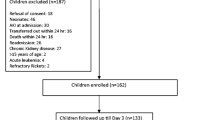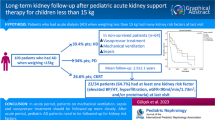Abstract
Purpose
Hypophosphatemia during renal replacement therapy (RRT) is common in critically ill patients with acute kidney injury (AKI). The clinical consequences of RRT-induced phosphate depletion are not well defined in this patient population, and there is no evidence that intravenous sodium phosphate supplementation (PS) prevents the clinical sequelae of acute hypophosphatemia. The purpose of this retrospective analysis of the Acute Renal Support Registry of the University of Munich was to examine the association between severe hypophosphatemia and severity of and recovery from AKI.
Methods
289 ICU patients with AKI on intermittent hemodialysis (IHD) were included in the study. One hundred and forty-nine patients received PS during IHD. Outcomes were short-term (at discharge) and long-term (at 1 year) recovery of renal function and mortality.
Results
The two patient groups did not differ in demographics, clinical features, renal characteristics, and frequency of hypophosphatemia at initiation of IHD. Without PS, the frequency of hypophosphatemia increased from 20 to 35%. Severe hypophosphatemia was found in 50% of these patients. By comparison, PS was not associated with an increased frequency of hypophosphatemia. Compared with patients with acute phosphate depletion, patients receiving PS developed less oliguria during IHD, had shorter duration of AKI, higher incidence of complete renal recovery at discharge, and a lower risk of de novo chronic kidney disease. Hypophosphatemia was associated with higher all-cause in-hospital mortality and higher risk of long-term mortality.
Conclusions
This multicenter study indicates for the first time that hypophosphatemia during IHD adversely affects short- and long-term outcome of critically-ill patients with AKI. The clinical consequences of the acute hypophosphatemic syndrome may be prevented by PS.


Similar content being viewed by others
References
Schiffl H (2010) The dark side of high-intensity renal replacement therapy of acute kidney injury in critically ill patients. Int Urol Nephrol 42:435–440
Bellomo R, Cass A, Cole L, Finfer S, Gallagher M, Lo S, McArthur C, McGuinness S, Myburgh J, Norton R, Scheinkestel C, Su S (2009) Intensity of continuous renal-replacement therapy in critically ill patients. N Engl J Med 361:1627–1638
Broman M, Carlsson O, Friberg H, Wieslander A, Godaly G (2011) Phosphate-containing dialysis solution prevents hypophosphatemia during continuous renal replacement therapy. Acta Anaesthesiol Scand 55:39–45
Demirjian S, Teo BW, Guzman JA, Heyka RJ, Paganini EP, Fissell WH, Schold JD, Schreiber MJ (2011) Hypophosphatemia during continuous hemodialysis is associated with prolonged respiratory failure in patients with acute kidney injury. Nephrol Dial Transplant 26(11):3508–3514
Palevsky PM, Zhang JH, O’Connor TZ, Chertow GM, Crowley ST, Choudhury D, Finkel K, Kellum JA, Paganini E, Schein RM, Smith MW, Swanson KM, Thompson BT, Vijayan A, Watnick S, Star RA, Peduzzi P (2008) Intensity of renal support in critically ill patients with acute kidney injury. N Engl J Med 359:7–20
Santiago MJ, Lopez-Herce J, Urbano J, Bellon JM, del Castillo J, Carrillo A (2009) Hypophosphatemia and phosphate supplementation during continuous renal replacement therapy in children. Kidney Int 75:312–316
Ratanarat R, Brendolan A, Volker G, Bonello M, Salvatori G, Andrikos E, Yavuz A, Crepaldi C, Ronco C (2005) Phosphate kinetics during different dialysis modalities. Blood Purif 23:83–90
Tan HK, Bellomo R, M’Pis DA, Ronco C (2001) Phosphatemic control during acute renal failure: intermittent hemodialysis versus continuous hemodiafiltration. Int J Artif Organs 24:186–191
Yakupoglu U, Parmaksiz E, Ozdemir N (2010) Two important factors in the follow-up of acute renal failure. Hypophosphatemia and respiratory alkalosis. Hemodial Int 14:97–98
Brunelli SM, Goldfarb S (2007) Hypophosphatemia: clinical consequences and management. J Am Soc Nephrol 18:1999–2003
Lumlertgul D, Harris DC, Burke TJ, Schrier RW (1986) Detrimental effect of hypophosphatemia on the severity and progression of ischemic acute renal failure. Miner Electrolyte Metab 12:204–209
Almeida AR, Wetzels JF, Bunnachak D, Burke TJ, Chaimovitz C, Hammond WS, Schrier RW (1992) Acute phosphate depletion and in vitro rat proximal tubule injury: protection by glycine and acidosis. Kidney Int 41:1494–1500
Kreusser W, Ritz E, Boland R (1980) Phosphate-depletion. J Mol Med 58:1–15
Singhal PC, Kumar A, Desroches L, Gibbons N, Mattana J (1992) Prevalence and predictors of rhabdomyolysis in patients with hypophosphatemia. Am J Med 92:458–464
Zazzo JF, Troche G, Ruel P, Maintenant J (1995) High incidence of hypophosphatemia in surgical intensive care patients: efficacy of phosphorus therapy on myocardial function. Intensive Care Med 21:826–831
Shor R, Halabe A, Rishver S, Tilis Y, Matas Z, Fux A, Boaz M, Weinstein J (2006) Severe hypophosphatemia in sepsis as a mortality predictor. Ann Clin Lab Sci 36:67–72
Brown JR, Kramer RS, Coca SG, Parikh CR (2010) Duration of acute kidney injury impacts long-term survival after cardiac surgery. Ann Thorac Surg 90:1142–1148
Vats HS, Dart RA, Okon TR, Liang H, Paganini EP (2011) Does early initiation of continuous renal replacement therapy affect outcome: experience in a tertiary care center. Ren Fail 33:698–706
Troyanov S, Geadah D, Ghannoum M, Cardinal J, Leblanc M (2004) Phosphate addition to hemodiafiltration solutions during continuous renal replacement therapy. Intensive Care Med 30:1662–1665
Author information
Authors and Affiliations
Corresponding author
Rights and permissions
About this article
Cite this article
Schiffl, H., Lang, S.M. Severe acute hypophosphatemia during renal replacement therapy adversely affects outcome of critically ill patients with acute kidney injury. Int Urol Nephrol 45, 191–197 (2013). https://doi.org/10.1007/s11255-011-0112-x
Received:
Accepted:
Published:
Issue Date:
DOI: https://doi.org/10.1007/s11255-011-0112-x




